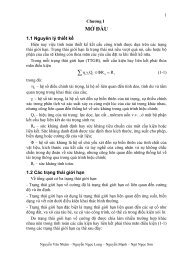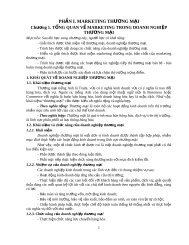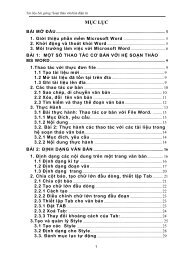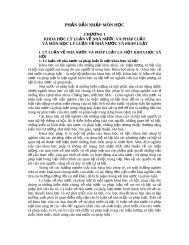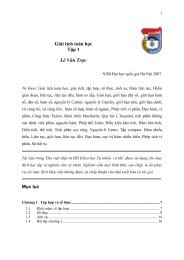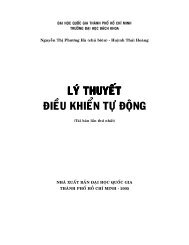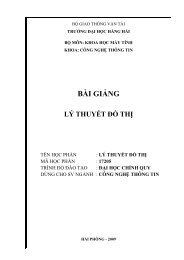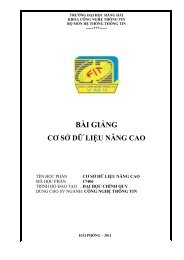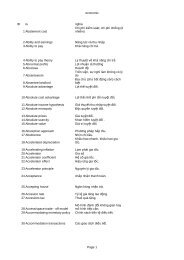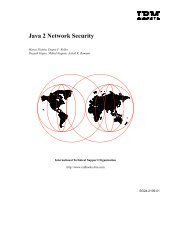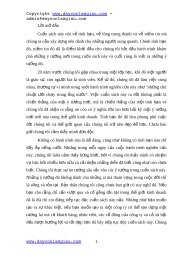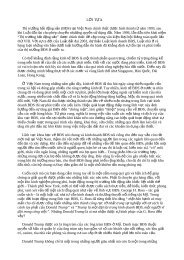- Page 1:
TLFeBOOK
- Page 6:
HOTEL FRONT OFFICE MANAGEMENTTHIRD
- Page 10:
To LindaYour love and encouragement
- Page 16:
TLFeBOOK
- Page 20:
xPREFACEof terms has been included,
- Page 24:
TLFeBOOK
- Page 30:
FOUNDERS OF THE HOTEL INDUSTRY 3pro
- Page 34:
HISTORICAL DEVELOPMENTS 5Historical
- Page 38:
HISTORICAL DEVELOPMENTS 7Marketing
- Page 42:
TYPES OF LODGING FACILITIES 9The de
- Page 46:
TYPES OF LODGING FACILITIES 11iii.
- Page 50:
TYPES OF LODGING FACILITIES 13long-
- Page 54:
SALES INDICATORS 15Services include
- Page 58:
LEVELS OF SERVICE 17ATLANTA—(BUSI
- Page 64:
20 CHAPTER 1: INTRODUCTION TO HOTEL
- Page 68:
22 CHAPTER 1: INTRODUCTION TO HOTEL
- Page 72:
24 CHAPTER 1: INTRODUCTION TO HOTEL
- Page 76:
26 CHAPTER 1: INTRODUCTION TO HOTEL
- Page 82:
END OF CHAPTER QUESTIONS 29overview
- Page 86:
KEY WORDS 31Notes1. Madelin Schneid
- Page 92:
34 CHAPTER 2: HOTEL ORGANIZATION AN
- Page 96:
TLFeBOOK
- Page 100:
38 CHAPTER 2: HOTEL ORGANIZATION AN
- Page 104:
40 CHAPTER 2: HOTEL ORGANIZATION AN
- Page 108:
42 CHAPTER 2: HOTEL ORGANIZATION AN
- Page 112:
44 CHAPTER 2: HOTEL ORGANIZATION AN
- Page 116:
46 CHAPTER 2: HOTEL ORGANIZATION AN
- Page 120:
48 CHAPTER 2: HOTEL ORGANIZATION AN
- Page 124:
50 CHAPTER 2: HOTEL ORGANIZATION AN
- Page 128:
52 CHAPTER 2: HOTEL ORGANIZATION AN
- Page 132:
54 CHAPTER 2: HOTEL ORGANIZATION AN
- Page 136:
56 CHAPTER 2: HOTEL ORGANIZATION AN
- Page 140:
58 CHAPTER 2: HOTEL ORGANIZATION AN
- Page 144:
60 CHAPTER 2: HOTEL ORGANIZATION AN
- Page 148:
62 CHAPTER 2: HOTEL ORGANIZATION AN
- Page 152:
64 CHAPTER 2: HOTEL ORGANIZATION AN
- Page 156:
Table 2-1. (Continued)Step 3. Calcu
- Page 160:
Table 2-1. (Continued)Step 4. Summa
- Page 164:
TLFeBOOK
- Page 170:
FRONT OFFICE INTERACTION WITH OTHER
- Page 176:
76 CHAPTER 3: EFFECTIVE INTERDEPART
- Page 180:
78 CHAPTER 3: EFFECTIVE INTERDEPART
- Page 184:
80 CHAPTER 3: EFFECTIVE INTERDEPART
- Page 188:
82 CHAPTER 3: EFFECTIVE INTERDEPART
- Page 192:
84 CHAPTER 3: EFFECTIVE INTERDEPART
- Page 196:
86 CHAPTER 3: EFFECTIVE INTERDEPART
- Page 200:
88 CHAPTER 3: EFFECTIVE INTERDEPART
- Page 204:
90 CHAPTER 3: EFFECTIVE INTERDEPART
- Page 208:
TLFeBOOK
- Page 212:
94 CHAPTER 4: PROPERTY MANAGEMENT S
- Page 216:
96 CHAPTER 4: PROPERTY MANAGEMENT S
- Page 220:
98 CHAPTER 4: PROPERTY MANAGEMENT S
- Page 224:
100 CHAPTER 4: PROPERTY MANAGEMENT
- Page 228:
102 CHAPTER 4: PROPERTY MANAGEMENT
- Page 232:
104 CHAPTER 4: PROPERTY MANAGEMENT
- Page 236:
106 CHAPTER 4: PROPERTY MANAGEMENT
- Page 240:
108 CHAPTER 4: PROPERTY MANAGEMENT
- Page 244:
110 CHAPTER 4: PROPERTY MANAGEMENT
- Page 248:
112 CHAPTER 4: PROPERTY MANAGEMENT
- Page 252:
114 CHAPTER 4: PROPERTY MANAGEMENT
- Page 256:
116 CHAPTER 4: PROPERTY MANAGEMENT
- Page 260:
118 CHAPTER 4: PROPERTY MANAGEMENT
- Page 264:
120 CHAPTER 4: PROPERTY MANAGEMENT
- Page 268:
122 CHAPTER 4: PROPERTY MANAGEMENT
- Page 272:
124 CHAPTER 4: PROPERTY MANAGEMENT
- Page 276:
TLFeBOOK
- Page 280:
128 CHAPTER 5: RESERVATIONSFigure 5
- Page 284:
130 CHAPTER 5: RESERVATIONSbrands.
- Page 288:
132 CHAPTER 5: RESERVATIONSthe cost
- Page 292:
134 CHAPTER 5: RESERVATIONSand conv
- Page 296:
136 CHAPTER 5: RESERVATIONSdetail i
- Page 300:
138 CHAPTER 5: RESERVATIONSFigure 5
- Page 304:
140 CHAPTER 5: RESERVATIONShigher i
- Page 308:
142 CHAPTER 5: RESERVATIONSFRONTLIN
- Page 312:
144 CHAPTER 5: RESERVATIONSTypes of
- Page 316:
146 CHAPTER 5: RESERVATIONStems, ba
- Page 320:
148 CHAPTER 5: RESERVATIONSFigure 5
- Page 324:
150 CHAPTER 5: RESERVATIONSBLOCKING
- Page 328:
152 CHAPTER 5: RESERVATIONSFigure 5
- Page 332:
154 CHAPTER 5: RESERVATIONSHousekee
- Page 336:
156 CHAPTER 5: RESERVATIONS5. Discu
- Page 340:
158 CHAPTER 5: RESERVATIONSMay 7:De
- Page 344:
TLFeBOOK
- Page 348:
162 CHAPTER 6: YIELD MANAGEMENTFigu
- Page 352:
164 CHAPTER 6: YIELD MANAGEMENTThe
- Page 356:
166 CHAPTER 6: YIELD MANAGEMENTSo h
- Page 360:
168 CHAPTER 6: YIELD MANAGEMENT•
- Page 364:
170 CHAPTER 6: YIELD MANAGEMENTOpti
- Page 368:
172 CHAPTER 6: YIELD MANAGEMENTFigu
- Page 372:
174 CHAPTER 6: YIELD MANAGEMENTMana
- Page 376:
176 CHAPTER 6: YIELD MANAGEMENTHOSP
- Page 380:
178 CHAPTER 6: YIELD MANAGEMENT8. D
- Page 384:
180 CHAPTER 6: YIELD MANAGEMENT8. I
- Page 388:
182 CHAPTER 7: GUEST REGISTRATIONof
- Page 392:
184 CHAPTER 7: GUEST REGISTRATIONer
- Page 396:
186 CHAPTER 7: GUEST REGISTRATIONFi
- Page 400:
188 CHAPTER 7: GUEST REGISTRATIONIN
- Page 404:
190 CHAPTER 7: GUEST REGISTRATION12
- Page 408:
192 CHAPTER 7: GUEST REGISTRATIONFi
- Page 412:
194 CHAPTER 7: GUEST REGISTRATIONRE
- Page 416:
196 CHAPTER 7: GUEST REGISTRATIONop
- Page 420:
198 CHAPTER 7: GUEST REGISTRATIONPr
- Page 424:
200 CHAPTER 7: GUEST REGISTRATIONsa
- Page 428:
202 CHAPTER 7: GUEST REGISTRATIONFR
- Page 432:
204 CHAPTER 7: GUEST REGISTRATIONFi
- Page 436:
206 CHAPTER 7: GUEST REGISTRATIONFi
- Page 440:
208 CHAPTER 7: GUEST REGISTRATIONFi
- Page 444:
210 CHAPTER 7: GUEST REGISTRATIONFi
- Page 448:
212 CHAPTER 7: GUEST REGISTRATIONFi
- Page 452:
Figure 7-19. This screen on a PMS p
- Page 456:
216 CHAPTER 7: GUEST REGISTRATIONCh
- Page 460:
218 CHAPTER 7: GUEST REGISTRATIONSo
- Page 464:
TLFeBOOK
- Page 468:
222 CHAPTER 8: PROCESSING GUEST CHA
- Page 472:
224 CHAPTER 8: PROCESSING GUEST CHA
- Page 476:
226 CHAPTER 8: PROCESSING GUEST CHA
- Page 480:
228 CHAPTER 8: PROCESSING GUEST CHA
- Page 484:
230 CHAPTER 8: PROCESSING GUEST CHA
- Page 488:
232 CHAPTER 8: PROCESSING GUEST CHA
- Page 492:
234 CHAPTER 8: PROCESSING GUEST CHA
- Page 496:
TLFeBOOK
- Page 500:
238 CHAPTER 9: GUEST CHECKOUTThe us
- Page 504:
240 CHAPTER 9: GUEST CHECKOUTFigure
- Page 508:
242 CHAPTER 9: GUEST CHECKOUTFigure
- Page 512:
244 CHAPTER 9: GUEST CHECKOUTagency
- Page 516:
246 CHAPTER 9: GUEST CHECKOUTDebit
- Page 520:
248 CHAPTER 9: GUEST CHECKOUTFRONTL
- Page 524:
250 CHAPTER 9: GUEST CHECKOUTelectr
- Page 528:
252 CHAPTER 9: GUEST CHECKOUTFigure
- Page 532:
254 CHAPTER 9: GUEST CHECKOUTFigure
- Page 536:
256 CHAPTER 9: GUEST CHECKOUTnel. I
- Page 540:
258 CHAPTER 9: GUEST CHECKOUTCASE S
- Page 544:
TLFeBOOK
- Page 548:
262 CHAPTER 10: NIGHT AUDITFigure 1
- Page 552:
264 CHAPTER 10: NIGHT AUDITHOSPITAL
- Page 556:
266 CHAPTER 10: NIGHT AUDITFigure 1
- Page 560:
268 CHAPTER 10: NIGHT AUDITFRONTLIN
- Page 564:
270 CHAPTER 10: NIGHT AUDITFigure 1
- Page 568:
272 CHAPTER 10: NIGHT AUDITFigure 1
- Page 572:
274 CHAPTER 10: NIGHT AUDITformance
- Page 576:
276 CHAPTER 10: NIGHT AUDITTotal Re
- Page 580:
278 CHAPTER 10: NIGHT AUDITrates fo
- Page 584:
280 CHAPTER 10: NIGHT AUDITThe cont
- Page 588:
282 CHAPTER 10: NIGHT AUDITFigure 1
- Page 592:
284 CHAPTER 10: NIGHT AUDITFigure 1
- Page 596:
286 CHAPTER 10: NIGHT AUDITCASE STU
- Page 600:
288 CHAPTER 10: NIGHT AUDITMC $1,65
- Page 604:
290 CHAPTER 10: NIGHT AUDITFigure 1
- Page 608:
292 CHAPTER 10: NIGHT AUDITCASE STU
- Page 612:
294 CHAPTER 10: NIGHT AUDITCashier
- Page 616:
296 CHAPTER 10: NIGHT AUDITFigure 1
- Page 620:
298 CHAPTER 10: NIGHT AUDITCASE STU
- Page 624:
300 CHAPTER 10: NIGHT AUDITCashier
- Page 628:
302 CHAPTER 10: NIGHT AUDITFigure 1
- Page 632:
304 CHAPTER 10: NIGHT AUDITSoftware
- Page 636:
306 CHAPTER 11: MANAGING HOSPITALIT
- Page 640: 308 CHAPTER 11: MANAGING HOSPITALIT
- Page 644: 310 CHAPTER 11: MANAGING HOSPITALIT
- Page 648: 312 CHAPTER 11: MANAGING HOSPITALIT
- Page 652: 314 CHAPTER 11: MANAGING HOSPITALIT
- Page 656: 316 CHAPTER 11: MANAGING HOSPITALIT
- Page 660: 318 CHAPTER 11: MANAGING HOSPITALIT
- Page 664: 320 CHAPTER 11: MANAGING HOSPITALIT
- Page 668: 322 CHAPTER 11: MANAGING HOSPITALIT
- Page 672: 324 CHAPTER 11: MANAGING HOSPITALIT
- Page 676: 326 CHAPTER 11: MANAGING HOSPITALIT
- Page 680: 328 CHAPTER 11: MANAGING HOSPITALIT
- Page 684: 330 CHAPTER 11: MANAGING HOSPITALIT
- Page 688: TLFeBOOK
- Page 694: SCREENING FOR HOSPITALITY QUALITIES
- Page 698: DEVELOPING AN ORIENTATION PROGRAM 3
- Page 702: DEVELOPING AN ORIENTATION PROGRAM 3
- Page 706: DEVELOPING A TRAINING PROGRAM 341Fi
- Page 710: DEVELOPING A TRAINING PROGRAM 343Pr
- Page 714: STEPS IN THE TRAINING PROCESS 345ac
- Page 718: STEPS IN THE TRAINING PROCESS 347vi
- Page 722: ADMINISTERING A TRAINING PROGRAM 34
- Page 726: TRAINING FOR EMPOWERMENT 351positiv
- Page 730: AMERICANS WITH DISABILITIES ACT 353
- Page 734: CHAPTER RECAP 355Solution to Openin
- Page 738: END OF CHAPTER QUESTIONS 357tion of
- Page 742:
C H A P T E R 1 3Promoting In-House
- Page 746:
THE ROLE OF THE FRONT OFFICE IN MAR
- Page 750:
PLANNING A POINT-OF-SALE FRONT OFFI
- Page 754:
PLANNING A POINT-OF-SALE FRONT OFFI
- Page 758:
THEORIES OF MOTIVATION 367Theories
- Page 762:
TRAINING PROGRAMS FOR A POINT-OF-SA
- Page 766:
FEEDBACK 371FRONTLINE REALITIESfew
- Page 770:
PLANNING A POINT-OF-SALE FRONT OFFI
- Page 774:
CHAPTER RECAP 375Related cost of go
- Page 778:
NOTES 377CASE STUDY 1301The message
- Page 782:
C H A P T E R 1 4SecurityOPENINGDIL
- Page 786:
IMPORTANCE OF A SECURITY DEPARTMENT
- Page 790:
JOB ANALYSIS OF THE DIRECTOR OF SEC
- Page 794:
IN-HOUSE SECURITY DEPARTMENTS VERSU
- Page 798:
ROOM KEY SECURITY 387Figure 14-2. T
- Page 802:
ROOM KEY SECURITY 389tofino Bay Hot
- Page 806:
FIRE SAFETY 391Table 14-1. Maintena
- Page 810:
FIRE SAFETY 393Figure 14-3. Well-ma
- Page 814:
FIRE SAFETY 395Local fire departmen
- Page 818:
EMERGENCY COMMUNICATION 397Years la
- Page 822:
EMERGENCY COMMUNICATION 399Director
- Page 826:
EMPLOYEE SAFETY PROGRAMS 401HOSPITA
- Page 830:
Figure 14-7. Minutes from a safety
- Page 834:
END OF CHAPTER QUESTIONS 405• How
- Page 838:
NOTES 407He thanked her for her con
- Page 842:
Glossaryaccess time: the amount of
- Page 846:
GLOSSARY 411cash bank: a specific a
- Page 850:
GLOSSARY 413demographic data: size,
- Page 854:
GLOSSARY 415food and beverage direc
- Page 858:
GLOSSARY 417ink-jet: a printer that
- Page 862:
GLOSSARY 419motivation: investigati
- Page 866:
GLOSSARY 421predicted house count:
- Page 870:
GLOSSARY 423service strategy statem
- Page 874:
IndexAAccess time, 101Accounting, 1
- Page 878:
INDEX 427Coughlin, Paula, 387CPS (c
- Page 882:
INDEX 429Henderson, Ernest, 4Herzbe
- Page 886:
INDEX 431service incentives, 309-31
- Page 890:
INDEX 433SSafety, employee, 401-404




